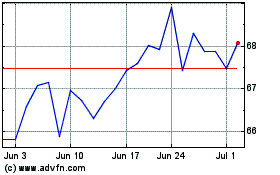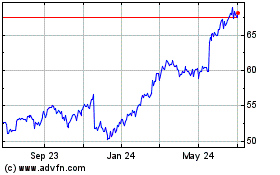Investor Statement in Support of Walmart Workers
We, the undersigned investors, are lending our
voice in support of the recent worker letter1 sent to the company, and Congresswoman Beatty’s call2 for Walmart
to address racial inequities in its business and workforce.
As long-term, responsible investors, we view effective
human capital management as critical to promoting increased productivity and business resilience, which can lead to a long-term competitive
advantage. While acknowledging the challenges of operating a low cost and large-scale business such as Walmart’s, we believe that
protecting and uplifting the company’s key resource, workers, will have a positive effect on the company’s day-to-day value
creation, whether by lowering turnover and enhancing motivation, or through reputational and operational excellence.
We continue to see untapped opportunities to increase
Walmart’s value creation and following the open letter from Walmart workers, we are concerned that the company lacks a strategic
vision for addressing systemic inequities and is not sufficiently remediating workers’ concerns, inhibiting the advancement of worker
well-being and the long-term success of the company and its shareholders.
As
the largest private employer in the world, including the largest private employer of Black people and people of color in the U.S., Walmart
is a systemically important economic actor with significant influence on its sector and the economy more broadly3,4. Frontline
Walmart employees have consistently raised serious concerns5 about sub-living wages that do not support themselves and their
families and about workplace safety issues6. Furthermore, there are concerns about racially motivated violence towards associates
tragically exemplified by the recent death of an 18-year-old Walmart associate in Rockford, Illinois7.
_____________________________
1 https://act.united4respect.org/a/agm-stakeholder-letter?sourceid=1121172&utm_medium=Zoom&utm_source=advocacy&utm_campaign=mayday
2 https://www.youtube.com/watch?v=qDprT_6UC0s
3 https://equitablegrowth.org/wp-content/uploads/2022/01/012822-WP-Walmart-Supercenters-and-Monopsony-Power-Wiltshire.pdf
4 https://www.ftc.gov/news-events/news/press-releases/2024/03/ftc-releases-report-grocery-supply-chain-disruptions
5 https://newrepublic.com/article/177515/death-walmart-workplace-safety-record
6 https://www.businessinsider.com/most-dangerous-parts-of-working-retail-walmart-target-employees-2023-5
7 https://www.newsweek.com/walmart-employee-stabbed-death-illinois-rockford-police-northridge-latest-1882901
A recent report from Oxfam America8
affirms these concerns with 91% of interviewed Walmart associates reporting experiencing dehydration over the past three months, 57% relating
that their production rate makes it difficult for them to use the bathroom at least some of the time, and 50% describing feeling burned
out from their work. Additional research9 demonstrates that workers of color generally experience higher rates of work-related
injuries, diseases, and psychological distress than white workers. Over half of Walmart’s U.S. workforce are people of color who
also account for a disproportionate number of employees not earning a living wage, which contributes to expanding racial income disparities
in the economy. Pressures from low-cost business models often manifest via poor enforcement of labor and human rights across food and
textile supply chains, with complex and hidden social issues continuing to expose companies like Walmart to market, reputational, and
legal risks. Given its economic significance, Walmart has a responsibility to its internal and external stakeholders to assess the racial
equity and human rights impacts and workplace safety issues faced by its 1.47 million frontline associates.
Call to Walmart:
Understanding the realities, systemic impacts,
and drivers of inadequate labor practices, along with building a long-term business strategy that creates value without reinforcing these
drivers, can contribute to effective risk management and value creation.
As several of this year’s shareholder proposals
outline10, there are tools and well-established methods for completing this first step of understanding how a company’s
policies, practices, products, and services are contributing or could contribute to harm to people and communities.
| · | Conduct an independent Racial Equity Audit.
As proposal #5 notes11, Walmart has faced intense public scrutiny over discriminatory hiring and promotion practices, such
as laying off double the number of Black workers as compared to white workers during the pandemic, as well as for its broader negative
impacts on communities of color. Racial equity audits have become a cross-sectoral standard with evidence of their benefits in helping
companies understand their own impact and how they can advance racial equity. |
| · | Conduct a Workplace Safety & Prevention
of Violence Assessment. Like a racial equity audit, a workplace safety assessment12 would help Walmart better understand
systemic and structural issues that are contributing to workplace violence, injuries, and even fatalities. A safe workplace is sound business
and contributes to increased worker retention, productivity, and morale, which can create value for the company, its workers, and
the economy.13,14 |
_____________________________
8 https://www.oxfamamerica.org/explore/research-publications/at-work-and-under-watch/
9 https://www.jstor.org/stable/j.ctv1chrwk5
10 https://s201.q4cdn.com/262069030/files/doc_financials/2024/ar/proxy-statement.pdf
11 https://www.sec.gov/Archives/edgar/data/104169/000121465924007919/g430247px14a6g.htm
12 https://www.sec.gov/Archives/edgar/data/104169/000121465924007828/e430240px14a6g.htm
13 https://www.osha.gov/safety-management
14 https://hbr.org/2023/09/worker-safety-needs-to-be-central-to-your-companys-operations
| · | Conduct a Human Rights Impact Assessment
to determine if and how Walmart’s practices cause, contribute, or are directly linked to human rights violations in its own operations
and beyond. Poor working conditions and abuses of workers’ rights, including in the U.S., violate Walmart’s Human Rights Policy15
and create risks to the company. Furthermore, regulations and national frameworks are increasingly expecting companies to conduct human
rights due diligence, including the National Action Plan on Responsible Business Conduct in the U.S.16 As the proposal states,
“HRIAs can help mitigate these risks by enabling Walmart to identify, analyze, and address the root causes of those risks.”17,18 |
| · | Establish living wage guardrails. As the
proponents of proposal #7 note, “Walmart’s starting pay [$14/hour] is deeply inadequate no matter the employee’s location
or family situation, and its average wage fails to meet the basic needs of single, childless employees even in the most economically disadvantaged
areas of the country.”19 And given that Walmart’s employees of color make up a disproportionate number of associates
who are not earning a living wage, this pay structure contributes to the increase in systemic, economy-wide racial disparity in income.
Establishing living wage guardrails based on external frameworks would help close the living wage gap and contribute to reduced racial
and gender inequalities and an estimated 4% increase in annual GDP20. |
| · | Engage directly with impacted stakeholders.
To better understand workers’ concerns around pay and benefits, as well as the challenging or unsafe conditions they face on the
job, it is imperative that Walmart directly engage with its associates and other impacted stakeholders. Engagement with these groups must
go beyond annual surveys or regular ‘touch points’ which, while useful feedback loops, are not a substitute in our view for
including workers in seeking solutions for the issues that impact them most directly. |
We recognize that Walmart has implemented numerous
benefits and programs over the years to improve the well-being of Walmart associates, including the expansion of healthcare benefits,
increases to wages, and career and education development opportunities. We also acknowledge the strong commitments Walmart has made to
advance racial equity, including its stated goal to “help replace the structures of systemic racism, and build in their place frameworks
for equity and justice.”21 However, we believe to fully realize this goal, the company needs to take more strategic and
proactive action on wages and workplace safety and do so with an explicit racial equity lens.
Sincerely,
ICCR Walmart Core Group
Supporting Investors:
_____________________________
15https://corporate.walmart.com/policies#human-rights-statement
16
https://www.state.gov/u-s-governments-national-action-plan-on-responsible-business-conduct-2/?
17
https://s201.q4cdn.com/262069030/files/doc_financials/2024/ar/proxy-statement.pdf
18
https://www.sec.gov/Archives/edgar/data/104169/000121465924008559/z57248px14a6g.htm
19
https://www.sec.gov/Archives/edgar/data/104169/000121465924007794/z429242px14a6g.htm
20
https://tacklinginequality.org/files/introduction.pdf
21
https://corporate.walmart.com/newsroom/2020/06/12/advancing-our-work-on-racial-equity
| Adasina Social Capital |
Natural Investments |
| |
|
| Adrian Dominican Sisters, Portfolio Advisory Board |
Nia Impact Capital |
| |
|
| Æquo Shareholder Engagement Services |
Oxfam America |
| |
|
| Amalgamated Bank |
Region VI Coalition for Responsible Investment |
| |
|
| AP Pension |
Rhia Ventures |
| |
|
| Benedictine Sisters, Boerne Texas |
School Sisters of Notre Dame Collective Investment Fund |
| |
|
| Bon Secours Mercy Health |
Seventh Generation Interfaith Coalition for Responsible Investment |
| |
|
| Congregation of St. Joseph |
SharePower Responsible Investing |
| |
|
| CorpGov.net |
Sinsinawa Dominicans |
| |
|
| Corporate Responsibility Office - Province of Saint Joseph of the Capuchin Order |
Sisters of Charity of Saint Elizabeth |
| |
|
| Daughters of Charity, Province of St. Louise |
Sisters of St. Francis of Philadelphia |
| |
|
| Dominican Sisters ~ Grand Rapids (MI) |
Sisters of the Humility of Mary |
| |
|
| Dominican Sisters of Sparkill |
SOC Investment Group |
| |
|
| Dominican Sisters of Springfield, IL |
Socially Responsible Investment Coalition |
| |
|
| Ethical Capital |
Sustainable Advisors Alliance, LLC |
| |
|
| Figure 8 Investment Strategies |
Tulipshare |
| |
|
| First Affirmative |
Veris Wealth Partners |
| |
|
| Global Systematic Investors, LLP |
William Caspar Graustein Memorial Fund |
| |
|
| Green America |
Zevin Asset Management |
| |
|
| Harkins Wealth Management |
|
| |
|
| Harrington Investments, Inc. |
|
| |
|
| Investor Advocates for Social Justice (IASJ) |
|
| |
|
| Maryknoll Sisters |
|
| |
|
| Mercy Investment Services, Inc. |
|
| |
|
| Missionary Oblates of Mary Immaculate |
|
| |
|
| National Black Worker Center |
|
Walmart (NYSE:WMT)
Historical Stock Chart
From Jun 2024 to Jul 2024

Walmart (NYSE:WMT)
Historical Stock Chart
From Jul 2023 to Jul 2024
